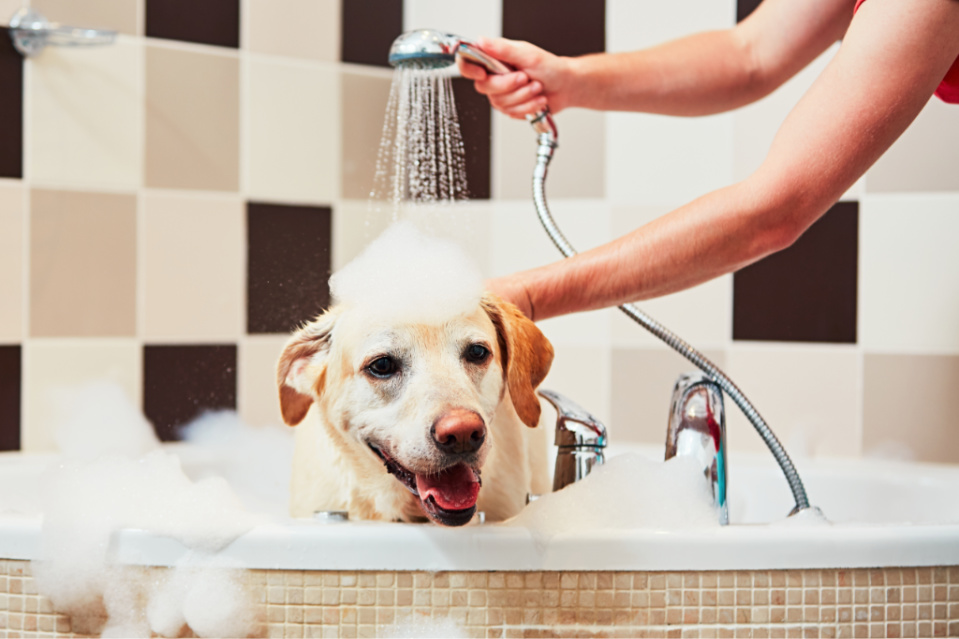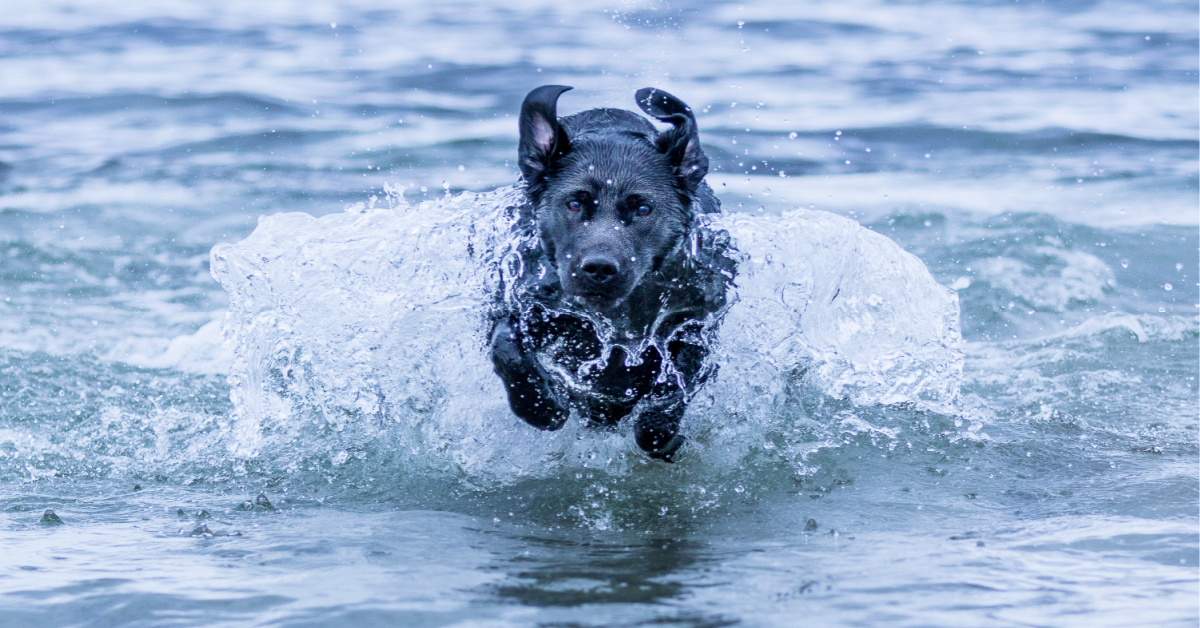“Labradors are known for loving being in the water, but why doesn’t my Lab like water?”
“My Labrador doesn’t want to swim in the water like the other Labs! What should I do to make my Lab like water?”
As one of the most sought-after dog breeds, Labrador Retrievers are popular mostly for being even-tempered, trainable, easy to get along with, friendly, and kind.
Another one of those characteristics that they are well-known for is their love of water.
Most Labradors love to play on the beach and just have fun in the water because of certain inherited characteristics that they got from their ancestor, the St. John’s Water-Dog.
Despite this, not all Labs love being in the water. And some owners may find it odd or alarming when they discover that their Lab is afraid of water.
Essentially, however, your little Lab should be typically just fine.
If your Labrador Retriever doesn’t like water, it is not really anything you need to worry much about as long as they are happy and healthy.
Why do Labs like water so much?
Before we answer the question of why your Lab doesn’t like water. Let’s step back a bit and try to get a grasp on why Labs generally like water. The answer to why they have a natural propensity and inclination to water lies in their breeding and history.
Much like the rest of the creatures that are alive today, domestic dogs are a product of adapting and evolving to the circumstances presented to them.
In the past, centuries ago, Labradors were not yet pets, gun dogs, or even Labradors exactly.
We can trace the history of the Labrador Retriever dog breed to some centuries ago in Newfoundland, Canada where a breed of working dog called the St. John’s Water Dog thrived. The Lab was originally bred from a breed of dogs that were excellent water dogs (Tavares, 2011).
Eventually, the St. John’s Water Dog made its way to England, where people subsequently dubbed them as Labrador. Take note that this was in the early 1800s, which is still a significant time ago. From that point, the Labrador became less of a fishing dog and more of a working gun dog catching for their owners.
In the early 20th century, the Labrador became an officially recognized breed and started to become the loving household pets we know of them today.
So, what does all that have to do with Labs and why they like water?

As a fishing dog, the ancestors of the Labrador had some characteristics that made the job easier. As such, Labs inherited and carried some of these characteristics throughout many centuries of breeding.
Though there is little pragmatic use for these features, they should still noted, as they are some of the hallmark features that breed standards call for.
Labs have an excellent, waterproof double coat that helps insulate them from the cold and the heat. Their coat is one of the most notable things about them, and it is interesting to recognize that the coat has so much purpose.
Other characteristics include a Labrador’s otter tail and webbed feet. These characteristics are most important in helping a Lab swim and navigate the waters.
Some Labs also have a thinner tail that does not resemble much of an otter tail. However, these Labs still recognized as Labradors and are perfect in their own right.
The Labrador’s history and their inherited characteristics all make a dog that loves playing in the water. It is not so much as one thing that makes Labradors love the water but a collection of all the history and ingrained adaptive characteristics that they have.
Why doesn’t my Lab like water?
Considering all that, most Labradors would predisposed to spending time in the water.
However, this is not the case in all situations. There are Labradors that do not like water, and that is nothing completely out of the ordinary.
There are several reasons that your Lab might not like the water. But, don’t fret. Even if your Lab does not like water, it does not mean that there is something wrong with them.
1. Individual differences
When talking about why your Lab does not like water, you cannot take individual differences out of the conversation.
Although most Labradors take to water quite well, not every Lab will do so in the same way, manner, or degree.
It is completely reasonable for your Lab to just be not quite a huge fan of water. Sometimes, it just does not go deeper than that. Your Labrador’s personal preferences are still theirs even if they are influenced by nature and instinct.
2. The show lab and the working lab
On a large scale, Labradors can be divided into two types: show Labs and working Labs. Otherwise well they known as the English Labrador and the American Labrador, respectively.
Over the years, the distinction between the two types of Labradors has increased. Although both are still Labradors, all the same, they have physical differences that separate them from each other.
These changes are due, in part, to specific breeding and the different roles that they fulfill.
The American Labrador, also the working Lab, does way more fieldwork than its English counterpart. In effect, the American Lab is also much more slender and athletic in build. This build strays away from the traditional stocky nature of a breed standard Labrador.
Since the American Lab spends a considerable amount of time in the field and in the water, the chances of them retaining the inclination to swimming and water are quite high.
On the other hand, the English Lab is mostly bred for show. The English Lab looks more like a traditional Lab with a stocky build and a square head. However, they get much less fieldwork and time in the water than work Labs.
Because of the characteristics of a field lab and a show lab, the two types of Labrador rarely bred together. This creates an even wider gap between the two and slowly wanes the inclination to water among the show Labs.
Of course, that’s not to say that just because your Lab comes from a show line, they will no longer like water or vice versa. This is only an additional consideration that is worth thinking about.
3. Your Lab is not used to the water yet.
No one is born fearless. In the same way, not all Labradors are born with the mindset of not being afraid of water even when they have not encountered it yet.
In some cases, the reason why your Labrador does not seem to like the water is just that it is something that is still unfamiliar to them.
Water being an unfamiliar matter is a perfectly acceptable reason why your Lab seems to dislike the water. This may resolve itself over time and may take some getting used to for your Labrador. However, you can also try to introduce them to water under favorable circumstances.
4. Traumatic experiences
Traumatic experiences are a sad fact in some dogs’ lives. This is especially true when the dog is a rescue dog and has a history of abuse and mistreatment from their previous owners.
In these situations, facing something such as water, whether unfamiliar or not, can be hair-triggering for them and not a pleasant experience overall.
You have to understand your Labrador’s needs for them to overcome this hurdle. If your dog is visibly anxious or clearly does not like the water, don’t force them into it. A better way would be to slowly ease them into the idea of water.
What to do if a Lab does not like water
The first thing that you can do is try to understand what your dog needs and where they are coming from with their fear and apprehension.
When you know this, you can approach the situation appropriately and effectively.
You can then slowly introduce them to the idea of water and how much of an opportunity it is for fun and how it is nothing to be scared of.
Do not rush them into the process, though, as it can take time for your dog to adjust the way they perceive the subject.
You can then go from there by engaging them in water-related activities when they are comfortable.
Beyond that, your dog will probably be just fine even if they decide that they really don’t like water. It is by no means unusual nor abnormal if your Lab goes against the preconception of the Labrador breed as swimmers. You have nothing to lose in this situation.
What is important is that you treat your Lab with the care and affection that they need so that they will live a fruitful life, fun in the water or not.







